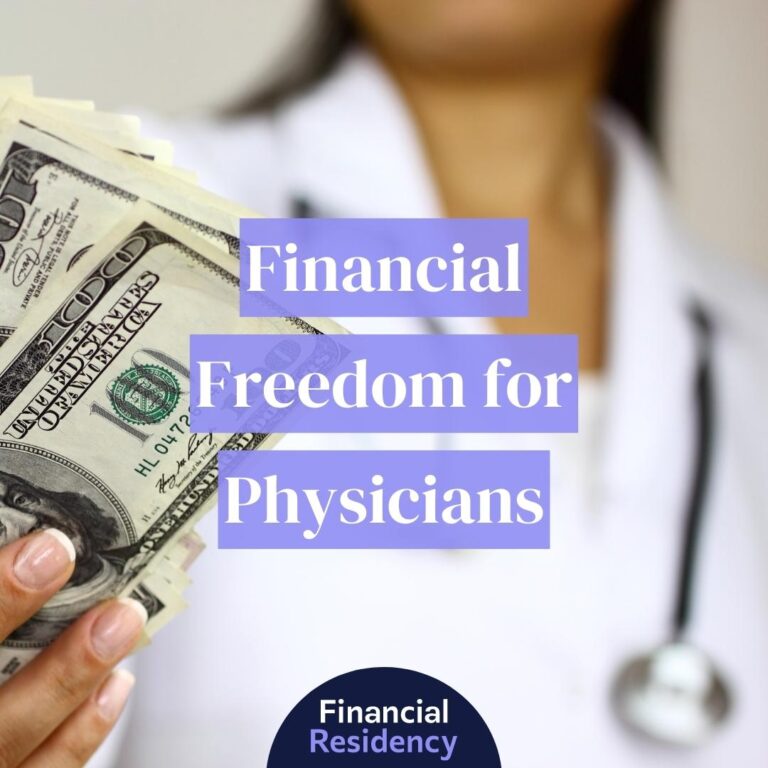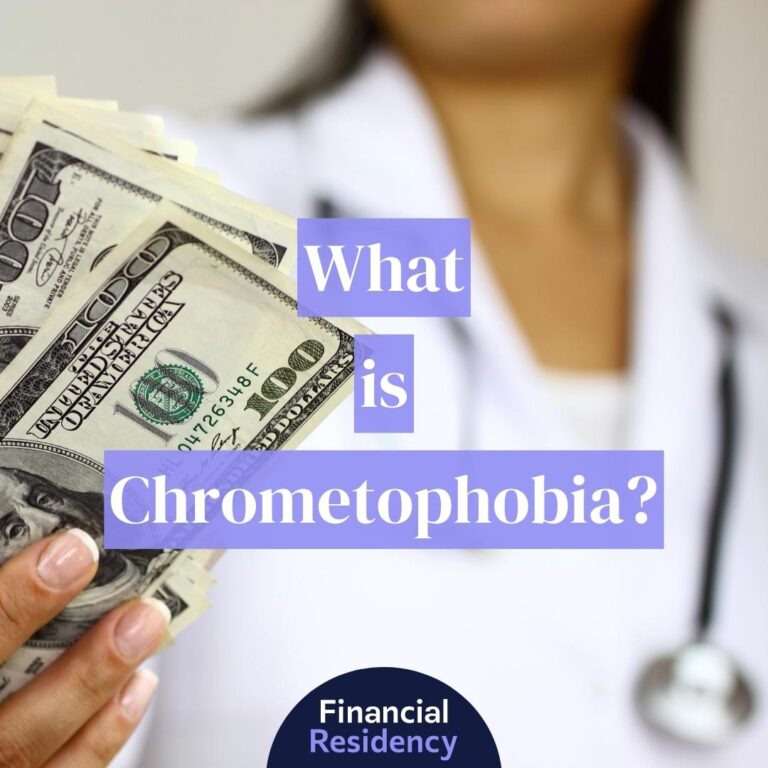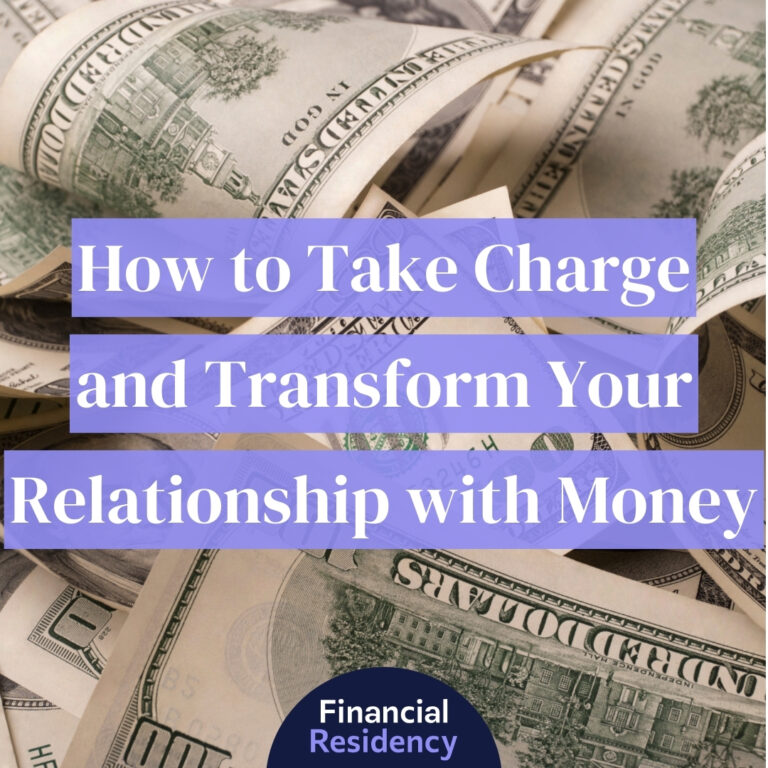Money is one of the top stressors expressed by physicians next to the day-to-day grind. So, helping you gain control of your money is a goal for this podcast.
What this translates to is an effort to help you make better financial choices overall that lead to financial independence or developed a sense of purpose leading to your ideal life.
My hope is that by sticking around, we can help you knock out your student debt faster, become a better investor, and ultimately, build a foundation of financial knowledge.
I want to help you understand how investments work. I also strive to clarify simple things, such as why you need a budget and how to set it up. Then there are more complex issues to explore: How to choose a financial advisor based on how their rates are structured.
One of my favorite blogs is written by The Physician Philosopher. His unique perspective concerning money is quite great.
He combines information on wealth and wellness.
He believes that there is no point in talking about wealth without having perspective. His new article is along the lines of… If I had more money would I be happier?
This is…
My question exactly!
All my emphasis on attaining financial independence and wealth begs the question: Can money buy happiness for a physician?
Where Are We Coming From?
I’m fascinated with the relationship attending physicians have with money. One of my favorite topics is behavioral finance, which is the psychology of our financial decisions. A lot of your perspective will come from the environment you were raised in and how your family handled money. The influence money has over a physician’s life can be huge—in either a positive or negative way.
A medical student starts in a position of physical and mental stress. Every goal is a high-stakes event. You are struggling on an average salary that can’t keep up with the mounting debt.
Then the metamorphosis occurs—and suddenly you are making triple the amount. It opens endless possibilities of things to buy, places to go and life changes to make! It seems surreal…. but can money buy happiness for a physician?
Maybe or Maybe not.
Can Money Buy Happiness for a Physician?
The short answer is once your essential needs are being met, money is not likely to make you happier unless you are using it to a certain purpose. However, physicians are notorious for handling their money poorly and that might lead to problems down the road.
So, can money buy happiness for a physician? It might buy you peace of mind by having your finances in order!
When asking yourself can money buy happiness for a physician, you may look at the research of George Kinder. I find his fascinating, as I am a registered Life Planner with his program. In December 2017, my wife and I answered the Kinder Questions on a show that addressed framing your ideal life, if you want to check that out. If you would like to answer the questions, they are:
- If money were no object, would you change your life? How would you change it?
- If your doctor told you that you had 5-10 years left to live (You will have no notice of your death date, but you won’t feel sick during this time), what would you do? How would you live?
- Your doctor tells you that you have 24 hours left to live, reflecting on your life: What did you miss? What did you not get to do? Who did you not get to be? What did you not get to experience?
One of the things that I find both interesting and sad is that physicians think that making more money will help with their feelings of burnout. Plus, money is something that physicians feel they have some control over. However, Physicians are notorious for mismanaging their money. Positive financial habits are nowhere to be found. The Physician Philosopher has addressed this in his blog, and he stated that:
- 42% of physicians are burned out
- Up to 50% of some specialties are burned out
What is the cause of physician burnout?
- Lack of autonomy
- Lack of support from the administration
- The electronic medical record system
- A decrease in patient satisfaction
- Insurance companies
The problem with these stated causes of burnout are that they are not within your control. This is when a physician thinks that if he was only paid a little bit more things would be better. However, if you go back to what I said earlier that physicians are terrible with money—then getting paid more isn’t going to make things better. They will put any extra money toward things that don’t make a difference or make their finances stronger. The bottom line is the extra money would not be spent in a way that adds value to a physician’s life.
When I was doing research for this show I thought back to my psychology class. I remember learning about intrinsic and extrinsic motivation (carrot and stick motivation). The motivation and explanation of this are physicians feel the need to get into the best medical school, I just need to get into the top residency, then a good fellowship. When those are accomplished, what do I do next?
You want autonomy, purpose, and mastery (working on something that is challenging)? I think that when those aren’t present you aren’t happy. Money is thought to be a suitable replacement…but it brings you back to the question can money buy happiness for a physician?
I see so many different types of relationships between my clients and their money. I don’t believe working harder for success will make you any happier—but neither does an additional load of money. So how much money will guarantee a level of happiness? According to The Physician Philosopher and other resources somewhere between $75-90K, a year is enough to take care of your needs.
If you earn more than this there is no guarantee of long-term sustained happiness. Almost everyone on every level of income thinks if they earn 20-25% more it will be just what they need to be happy. They think this will be just enough of a boost to make a difference.
However, most physicians feel this way because they make huge financial mistakes when they finish training. They might buy the Tesla or a huge new house before paying off student debt. They expand their lifestyle and then feel like they need to expand their income to above $75-90K. They may earn hundreds of thousands of dollars and yet live paycheck to paycheck. Now, we ask again can money buy happiness for a physician?
Skimming Money Off the Top
I want to talk about lifestyle creep because it is very real. There are many different things that contribute to the spending increase. When we are talking about lifestyle creep we veer into the territory of discretionary spending.
Are you seeing things that you once lived without as necessary now? Here is a list of examples of the multiple factors to lifestyle creep:
- The new car
- Expensive trips
- Eating out more
- A more expensive daycare
- A nanny, maid and a cook
- Cable/satellite television
- Choosing brand clothing or food
- Hobbies/club dues
While it is good to treat yourself when your income increases, you need to become intentional of where you want your money to go. Here are some tips to combat lifestyle creep:
- Pay your emergency fund first
- Choose like-minded friends
- Pay your retirement fund
- Write down your goals
And another great tip as explained below is skimming off the top as your reward for your hard work.
The median income in the United States is $60K. A pediatrician is making $200K—that is way above the median, yet they don’t feel like it.
Is there a way to be satisfied with what you have?
You could fall back on the ten percent rule.
If you have any increase in post-tax take-home pay after training, you may take 10% and spend it on anything you want.
The Physician Philosopher admitted that he is a fan of cars. He made the terrible decision of financing a car. However, he chose to do in a fully informed fashion. He also bought a cheap country club membership in order to spend time with his daughter playing golf. These choices are in alignment with his values (spending time with family and building close relationships).
[easy-tweet tweet=”If you’re going to make a big purchase, be sure to associate a purpose says @physphilosopher.” user=”physicianwealth” url=”https://financialresidency.com/podcast/will-making-more-money-make-a-physician-more-happy”]
He then used the remaining 90% to build his wealth by paying off his student loans. He knocked out $200K student debts in just 20 months.
The important thing is to reframe your choices using a positive viewpoint. Use 10% of any bonuses or extra unexpected money that comes in for whatever you want.
I would explain it this way: A resident earns $50K. When he becomes an attending physician that may jump to $200K. That is a difference of $150K. That means you have $15K of fun money.
The Physician Philosopher is not shy about being transparent with his finances. So, I will use the information he posted on his website regarding his financial plan. He used post-tax numbers, but you could use pre-tax numbers:
- As a fellow in a non-credited program, he earned $5,000 a month
- As an attending physician, he earned $16,000 post-tax a month
- There was a $10,000 a month difference
- He had $1,000 to spend on what he wanted
- He put $9,000 toward eradicating his debt (his student loan payment was $6,000, plus he contributed to his 403B, Backdoor Roth)
Can money buy happiness for a physician? It might if you are intentional and know where you want your money to go. I am not a car person, I would love to own a Tesla, but I have no reason to buy a $100,000 car. I favor using money for experiences rather than material things. Studies support the idea that money spent on activities and experiences are more valuable than material things.
We are all trying to reach our goals and there will be mistakes. In the end, it’s all about your perspective. Can money buy happiness for a physician? It can. However, there are times when the pursuit of financial independence could be harmful. Are you being too restrictive with every dollar? Are you allowing yourself to spend your money on intentional activities that bring you and your family joy? Are you building and strengthening personal relationships?
Spending Versus Happiness
Unfortunately, after basic needs are being met, most people will spend money on material things. We can’t expect this type of spending to bring us joy or happiness. Too many physicians buy material goods to soothe or pacify themselves.
They expect the things they own to make them happy.
Can money buy happiness for a physician? The problem is that money spent on things that add clutter or debt to your life will not bring you happiness.
Prevention is the key to maintaining your financial independence. Don’t try to live up to anyone’s expectations and don’t attempt to emulate the other doctors you see! Don’t attempt to compare yourself to other people.
Live within your means—even if it means giving up the idea of a Tesla!
What if you are already in the hole? What if you are already stretched far too thin? Accept that we all make mistakes. Finances are my profession and I’ve made mistakes. I was blasted on the forum recently for buying a new car. I bought it after seeing an accident involving the exact car type that I was driving. Buying the new vehicle is for my peace of mind.
Look at some ways to cut down on your expenses. Then take that money and use it to build wealth. I believe you can change anything going forward.
Can money buy happiness for a physician? It can— if you look ahead and plan well. If you use money in a way that aligns with your values.
Wealth for its own sake is not the goal. Having control of your future is the goal. Building good relationships, enjoying activities and making memories is the goal!
Can money buy happiness for a physician?
What is your opinion?
Is your spending in alignment with your values?
Do you spend mostly on material objects or on activities?




